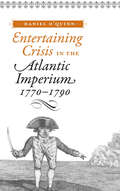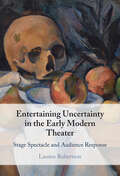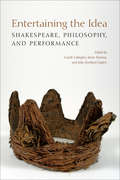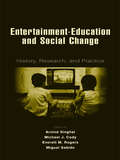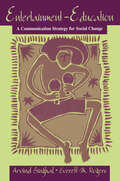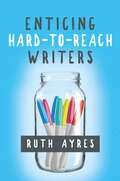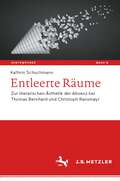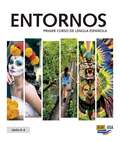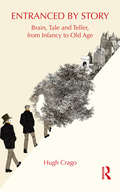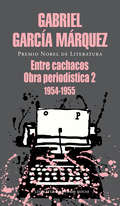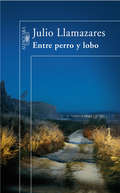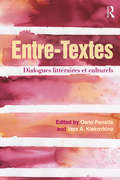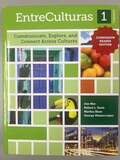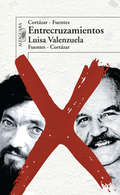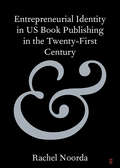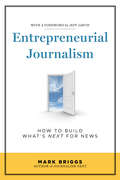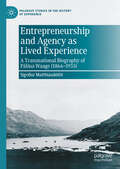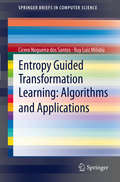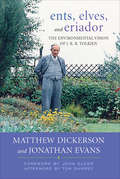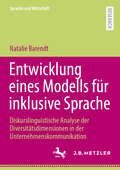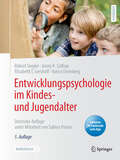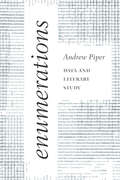- Table View
- List View
Entertaining Crisis in the Atlantic Imperium, 1770–1790
by Daniel O'QuinnHonorable Mention, 2012 Joe A. Callaway Prize in Drama and TheaterFirst Place, Large Not-for-Profit Publisher, Typographic Cover, 2011 Washington Book Publishers Design and Effectiveness AwardsLess than twenty years after asserting global dominance in the Seven Years' War, Britain suffered a devastating defeat when it lost the American colonies. Daniel O'Quinn explores how the theaters and the newspapers worked in concert to mediate the events of the American war for British audiences and how these convergent media attempted to articulate a post-American future for British imperial society.Building on the methodological innovations of his 2005 publication Staging Governance: Theatrical Imperialism in London, 1770-1800, O’Quinn demonstrates how the reconstitution of British imperial subjectivities involved an almost nightly engagement with a rich entertainment culture that necessarily incorporated information circulated in the daily press. Each chapter investigates different moments in the American crisis through the analysis of scenes of social and theatrical performance and through careful readings of works by figures such as Richard Brinsley Sheridan, William Cowper, Hannah More, Arthur Murphy, Hannah Cowley, George Colman, and Georg Friedrich Handel. Through a close engagement with this diverse entertainment archive, O'Quinn traces the hollowing out of elite British masculinity during the 1770s and examines the resulting strategies for reconfiguring ideas of gender, sexuality, and sociability that would stabilize national and imperial relations in the 1780s. Together, O'Quinn's two books offer a dramatic account of the global shifts in British imperial culture that will be of interest to scholars in theater and performance studies, eighteenth-century studies, Romanticism, and trans-Atlantic studies.
Entertaining Uncertainty in the Early Modern Theater: Stage Spectacle and Audience Response
by Lauren RobertsonLauren Robertson's original study shows that the theater of Shakespeare and his contemporaries responded to the crises of knowledge that roiled through early modern England by rendering them spectacular. Revealing the radical, exciting instability of the early modern theater's representational practices, Robertson uncovers the uncertainty that went to the heart of playgoing experience in this period. Doubt was not merely the purview of Hamlet and other onstage characters, but was in fact constitutive of spectators' imaginative participation in performance. Within a culture in the midst of extreme epistemological upheaval, the commercial theater licensed spectators' suspension among opposed possibilities, transforming dubiety itself into exuberantly enjoyable, spectacular show. Robertson shows that the playhouse was a site for the entertainment of uncertainty in a double sense: its pleasures made the very trial of unknowing possible.
Entertaining the Idea: Shakespeare, Performance, and Philosophy (UCLA Clark Memorial Library Series)
To entertain an idea is to take it in, pay attention to it, give it breathing room, dwell with it for a time. The practice of entertaining ideas suggests rumination and meditation, inviting us to think of philosophy as a form of hospitality and a kind of mental theatre. In this collection, organized around key words shared by philosophy and performance, the editors suggest that Shakespeare’s plays supply readers, listeners, viewers, and performers with equipment for living. In plays ranging from A Midsummer Night’s Dream to King Lear and The Winter’s Tale, Shakespeare invites readers and audiences to be more responsive to the texture and meaning of daily encounters, whether in the intimacies of love, the demands of social and political life, or moments of ethical decision. Entertaining the Idea features established and emerging scholars, addressing key words such as role play, acknowledgment, judgment, and entertainment as well as curse and care. The volume also includes longer essays on Shakespeare, Kant, Husserl, and Hegel as well as an afterword by theatre critic Charles McNulty on the philosophy and performance history of King Lear.
Entertainment-Education and Social Change: History, Research, and Practice (Routledge Communication Series)
by Everett M. Rogers Arvind Singhal Michael J. Cody Miguel SabidoEntertainment-Education and Social Change introduces readers to entertainment-education (E-E) literature from multiple perspectives. This distinctive collection covers the history of entertainment-education, its applications in the United States and throughout the world, the multiple communication theories that bear on E-E, and a range of research methods for studying the effects of E-E interventions. The editors include commentary and insights from prominent E-E theoreticians, practitioners, activists, and researchers, representing a wide range of nationalities and theoretical orientations. Examples of effective E-E designs and applications, as well as an agenda for future E-E initiatives and campaigns, make this work a useful volume for scholars, educators, and practitioners in entertainment media studies, behavior change communications, public health, psychology, social work, and other arenas concerned with strategies for social change. It will be an invaluable resource book for members of governmental and non-profit agencies, public health and development professionals, and social activists.
Entertainment-Education: A Communication Strategy for Social Change (Routledge Communication Series)
by Arvind Singhal Everett RogersArvind Singhal and Everett M. Rogers have developed this unique volume focused on the history and development of entertainment-education. This approach to communication is the process of designing and implementing a media message to both entertain and educate to increase audience members' knowledge about an educational issue, create favorable attitudes, and change overt behavior. It uses the universal appeal of entertainment to show individuals how they can live safer, healthier, and happier lives. Entertainment formats such as soap operas, rock music, feature films, talk shows, cartoons, comics, and theater are utilized in various countries to promote messages about educational issues. This book presents a balanced picture of the entertainment-education strategy, identifying ethical and other problems that accompany efforts to bring about social change.
Enticing Hard-to-Reach Writers
by Ruth AyresIn her moving and personal book Enticing Hard-to-Reach Writers. Ruth Ayres weaves together her experience as a mother, teacher, and writer. She explores the power of stories to heal children from troubled backgrounds and offers up strategies for helping students discover and write about their own stories of strength and survival. She shares her own struggles and triumphs and hard-earned lessons from raising a family of four adopted children. Her experience is invaluable to any teacher whose has met children living in poverty, in unstable households, or in fear of abuse. Ayres explores brain research and the ways trauma can change the brain and how encouraging all students to write can help offset some of these effects. She believes that all students benefit from revealing their stories, by communicating information and opinion that allows darkness to turn to light in the lives of children. In the last part of her book she offers up practical suggestions for enticing all writers, regardless of their struggles. Enticing Hard-to-Reach Writers invites you on a journey to become a teacher who refuses to give up on any student, who helps children believe that they can have a positive impact on the world, and who—in some cases becomes the last hope for a child to heal.
Entleerte Räume: Zur literarischen Ästhetik der Absenz bei Thomas Bernhard und Christoph Ransmayr (Kontemporär. Schriften zur deutschsprachigen Gegenwartsliteratur #9)
by Kathrin SchuchmannVorstellungen von Absenz wirken in der Gegenwart auf breiter Basis – auch in der Literatur. Doch wie sind diese medial vermittelt? Geht man davon aus, dass Absenz-Phänomene sich nicht in einer primordialen Leere ereignen, sondern dass ihnen eher mit Vorstellungen vom Unbestimmten, Unverfügbaren und Möglichen beizukommen ist, rücken Verräumlichungsformen in den Fokus, die bewegungslogisch zu erklären sind. Um das intrikate Verhältnis von Möglichkeitsformen und ‚Wirklichkeit‘ innerhalb der Grenzen des Sagbaren zu verhandeln, begegnen ihm Thomas Bernhards und Christoph Ransmayrs Erzähltexte mit Verfahren der Verräumlichung. Aus der Perspektive einer Ästhetik der Absenz poetisieren diese Erzähltexte Wahrnehmungsschwellen, indem sie Abwesendes textphänomenal verräumlichen, es jedoch nicht im (topo-)graphischen containment absichern, sondern eine Topologie eröffnen, die auf Strategien des displacement setzt. Die Studie führt raumtheoretische Ansätze unter einer differenztheoretischen Perspektive mit einem Konzept von Virtualität zusammen, um literarische Verfahren der Verräumlichung von Absenz in Erzähltexten von Bernhard und Ransmayr zu untersuchen.
Entornos Units 0-4
by Celia MeanaEntornos, an introductory Spanish course, helps you develop the language you need to connect to real-world, practical issues. Entornos supports communicative, empowered learning. Inductive learning helps students deepen their understanding of language through discovery and inference. Real-life learning gives immersive, relatable scenarios, and provides a framework for communication. Learning strategies reinforce learning as students understand the processes and methods that work best for them. Social and emotional relevance increases students' motivation to learn a language, boosting acquisition and retention. Cultural and intercultural learning builds global awareness while developing authentic communication skills.
Entranced by Story: Brain, Tale and Teller, from Infancy to Old Age (Children's Literature and Culture)
by Hugh CragoWe live in a world of stories; yet few of us pause to ask what stories actually are, why we consume them so avidly, and what they do for story makers and their audiences. This book focuses on the experiences that good stories generate: feelings of purposeful involvement, elevation, temporary loss of self, vicarious emotion, and relief of tension. The author examines what drives writers to create stories and why readers fall under their spell; why some children grow up to be writers; and how the capacity for creating and comprehending stories develops from infancy right through into old age. Entranced by Story applies recent research on brain function to literary examples ranging from the Iliad and Wuthering Heights to Harold and the Purple Crayon, providing a groundbreaking exploration of the biological and neurological basis of the literary experience. Blending research, theory, and biographical anecdote, the author shows how it is the unique structure of the human brain, with its layering of sophisticated cognitive capacities upon archaic, emotion-driven functions, which best explains the mystery of story.
Entre Eternidades: Y Otros Escritos
by Javier MaríasUna nueva y estimulante colección de textos personales y críticos de Javier Marías, aclamado autor de Los enamoramientos y Corazón tan blanco, que abarcan más de veinte años de su trabajo como escritor. Javier Marías es un incansable examinador del mundo que nos rodea: ensayista, novelista, traductor, lector voraz, refutador implacable de lo pretencioso y erudito entusiasta. Es capaz de descubrir lo que muchos de nosotros no notamos o nunca hemos podido expresar con palabras, y sigue observando cuando la mayoría hemos dejado de hacerlo. Esta nueva colección de ensayos entre literarios, filosóficos y autobiográficos viaja desde los decadentes canales de Venecia hasta los amplios horizontes del Salvaje Oeste, y Marías captura cada nuevo panorama con ingenio y una agudeza afilada. Explora, con su característico entusiasmo, temas que van del fútbol al cine clásico, de las historietas y los soldaditos de plomo a la mortalidad y la memoria, de "La ciudad más presumida" a "Por qué casi nadie es de fiar", haciendo brillante e inimitablemente suyo cada uno de ellos. Incisiva e irónica, subversiva y penetrante, Entre eternidades es una colección de deslumbrante curiosidad intelectual que ofrece una amplia visión de la vasta mente del hombre de quien tan a menudo se dice que es el mejor escritor español vivo.
Entre Eternidades: Y otros escritos
by Javier MariasUna nueva y estimulante colección de textos personales y críticos de Javier Marías, aclamado autor de Los enamoramientos y Corazón tan blanco, que abarcan más de veinte años de su trabajo como escritor. Javier Marías es un incansable examinador del mundo que nos rodea: ensayista, novelista, traductor, lector voraz, refutador implacable de lo pretencioso y erudito entusiasta. Es capaz de descubrir lo que muchos de nosotros no notamos o nunca hemos podido expresar con palabras, y sigue observando cuando la mayoría hemos dejado de hacerlo. Esta nueva colección de ensayos – entre literarios, filosóficos y autobiográficos— viaja desde los decadentes canales de Venecia hasta los amplios horizontes del Salvaje Oeste, y Marías captura cada nuevo panorama con ingenio y una agudeza afilada. Explora, con su característico entusiasmo, temas que van del fútbol al cine clásico, de las historietas y los soldaditos de plomo a la mortalidad y la memoria, de "La ciudad más presumida" a "Por qué casi nadie es de fiar", haciendo brillante e inimitablemente suyo cada uno de ellos. Incisiva e irónica, subversiva y penetrante, Entre eternidades es una colección de deslumbrante curiosidad intelectual que ofrece una amplia visión de la vasta mente del hombre de quien tan a menudo se dice que es el mejor escritor español vivo.
Entre cachacos: Obra periodística, 2 (1954-1955)
by Gabriel García MárquezEsta segunda entrega de la obra periodística de García Márquez reúne los artículos aparecidos durante los años 1954 y 1955. El segundo volumen de la obra periodística de Gabriel García Márquez, Entre cachacos, reúne -recopilados y prologados por Jaques Gilard- los artículos aparecidos en El Espectador de Bogotá durante los años 1954 y 1955, textos que desentrañan los signos que configuran los temas predilectos del gran novelista colombiano. Aparecen ya las consecuencias de ciertas lecturas, particularmente las de Camus y Hemingway, con reflexiones y análisis de hechos investigados en caliente, donde la forma delata preocupaciones literarias fundamentales y preexistentes y donde el rigor narrativo -la ambición por contar bien- supera al mero afán inicial de información para alcanzar un alto valor literario.
Entre cachacos: Obra periodística, 2 (1954-1955)
by Gabriel García MárquezEsta segunda entrega de la obra periodística de García Márquez reúne los artículos aparecidos durante los años 1954 y 1955. El segundo volumen de la obra periodística de Gabriel García Márquez, Entre cachacos, reúne -recopilados y prologados por Jaques Gilard- los artículos aparecidos en El Espectador de Bogotá durante los años 1954 y 1955, textos que desentrañan los signos que configuran los temas predilectos del gran novelista colombiano. Aparecen ya las consecuencias de ciertas lecturas, particularmente las de Camus y Hemingway, con reflexiones y análisis de hechos investigados en caliente, donde la forma delata preocupaciones literarias fundamentales y preexistentes y donde el rigor narrativo -la ambición por contar bien- supera al mero afán inicial de información para alcanzar un alto valor literario.
Entre perro y lobo
by Julio LlamazaresVeinte años del mejor periodismo de Julio Llamazares. «Entre chien et loup (entre perro y lobo) es como llaman los franceses a esa luz indecisa del atardecer que se produce cuando el sol ya se ha ocultado pero la noche no se ha adueñado todavía de la tierra. Pero entre perro y lobo es también una situación: la del que está a medio camino entre la domesticación y la libertad, que es en la que yo me he sentido siempre. No sólo en mi vida personal, sino también como escritor y como periodista. De aquí que haya elegido esa expresión para titular esta recopilación de mis artículos de prensa de los últimos veinticinco años. Que son los que, más o menos, llevo viviendo en Madrid dedicado en exclusiva a la literatura y el periodismo. Después de revisar uno por uno, después de releer los artículos, me reafirmo en mi opinión de mi condición ambigua, de escritor que escribe a caballo, tanto en prensa como en una novela, entre la imaginación y la realidad, de viajero, en fin, que mira la vida desde la ventanilla de un tren que cruza el paisaje envuelto en una luz que no es real ni irreal del todo. Esa luz que hace que el mundo no sea blanco ni negro, pese a que aparezca así en los periódicos».JULIO LLAMAZARES
Entre-Textes: Dialogues littéraires et culturels
by Oana Panaïté Vera A. Klekovkina<p>Entre-Textes introduces advanced students of French to the richness of the Francophone world through literature from the Middle Ages to the 21st century. <p>The course anthology is divided into fourteen modules, each of which pairs a classical text with a modern one. Students are guided to read works from different periods of time and cultural origin and consider how these echo, complement or question each other. Through comparing and contrasting the texts, students will develop a new approach to reading literature while simultaneously reinforcing linguistic and cultural competencies. <p>Suitable for advanced students of French and featuring texts from across the French-speaking world, Entre-Textes is an innovative course anthology with a flexible structure and versatile methodology.</p>
EntreCulturas Espanol 1
by Ann Mar Robert L. Davis Maritza Sloan George Watson-LópezCOMMUNICATE, EXPLORE, AND CONNECT ACROSS CULTURES
Entrecruzamientos: Interwoven
by Luisa ValenzuelaThis work is an essay that finds points of convergence and interweavings in the literary and life trajectories of two of literature’s greatest stars: Julio Cortázar and Carlos Fuentes. Luisa Valenzuela explores paths previously unknown to literary review and historiography, and she does it with an intimate, passionate style, with full knowledge of the facts. An internationally recognized writer, extraordinary conversationalist, and friend to Fuentes and Cortázar, Luisa is above all a great reader, possessed of a perceptive intelligence, and for that reason this work is not just a source of valuable discoveries for those who dedicate themselves to literary studies, but also a tale of anecdotes, moments, and feelings that will certainly be appreciated by all types of readers.
Entrepreneurial Identity in US Book Publishing in the Twenty-First Century (Elements in Publishing and Book Culture)
by Rachel NoordaEntrepreneurship underpins many roles within the publishing industry, from freelancing to bookselling. Entrepreneurs are shaped by the contexts in which their entrepreneurship is situated (social, political, economic, and national). Additionally, entrepreneurship is integral to occupational identity for book publishing entrepreneurs. This Element examines entrepreneurship through the lens of identity and narrative based on interview data with book publishing entrepreneurs in the US Book publishing entrepreneurship narratives of independence, culture over commerce, accidental profession, place, risk, (in)stability, busyness, and freedom are examined in this Element.
Entrepreneurial Journalism: How to Build What's Next for News
by Mark E. BriggsEntrepreneurial Journalism will inspire you with what's possible and show you the mechanics behind building a business. Working through eight clear and concise stages, you'll explore the secrets of successful news startups (including how they're making money) and learn how to be an upstart yourself, building an innovative and sustainable news business from scratch. Each chapter starts with a real entrepreneur's experience, teasing out how savvy and opportunistic journalists found their way to success. Mark Briggs then helps you size up the market, harness technology, turn your idea into a product or service, explore revenue streams, estimate costs, and launch. "Build Your Business" action items at the end of each chapter get you thinking through each step of your business plan.
Entrepreneurship and Agency as Lived Experience: A Transnational Biography of Pálína Waage (1864-1935) (Palgrave Studies in the History of Experience)
by Sigríður MatthíasdóttirHistorical research into female entrepreneurs has become a burgeoning field in recent years. However, there is still a lack of studies of businesswomen based on their personal documents, and such documents seem to be rare. This book, an appraisal of the nineteenth- and early twentieth-century East-Icelandic businesswoman Pálína Waage (1864-1935), fills that gap. It investigates the agency of a small-scale female entrepreneur, primarily based on her autobiography, diaries and letters, using the methodology of the history of experience and 'lived experience'.
Entropy Guided Transformation Learning: Algorithms and Applications
by Cícero Nogueira Santos Ruy Luiz MilidiúEntropy Guided Transformation Learning: Algorithms and Applications (ETL) presents a machine learning algorithm for classification tasks. ETL generalizes Transformation Based Learning (TBL) by solving the TBL bottleneck: the construction of good template sets. ETL automatically generates templates using Decision Tree decomposition. The authors describe ETL Committee, an ensemble method that uses ETL as the base learner. Experimental results show that ETL Committee improves the effectiveness of ETL classifiers. The application of ETL is presented to four Natural Language Processing (NLP) tasks: part-of-speech tagging, phrase chunking, named entity recognition and semantic role labeling. Extensive experimental results demonstrate that ETL is an effective way to learn accurate transformation rules, and shows better results than TBL with handcrafted templates for the four tasks. By avoiding the use of handcrafted templates, ETL enables the use of transformation rules to a greater range of tasks. Suitable for both advanced undergraduate and graduate courses, Entropy Guided Transformation Learning: Algorithms and Applications provides a comprehensive introduction to ETL and its NLP applications.
Ents, Elves, and Eriador: The Environmental Vision of J.R.R. Tolkien (Culture of the Land)
by Jonathan Evans Matthew Dickerson&“A fascinating ecocritical evaluation&” of The Hobbit, The Lord of the Rings, The Silmarillion and other works of the master fantasist (Northeastern Naturalist). The Hobbit, The Lord of the Rings, and The Silmarillion are rarely considered to be works of environmental literature or mentioned together with such authors as John Muir, Rachel Carson, or Aldo Leopold. Nonetheless, Tolkien&’s vision of nature is as passionate and has had as profound an influence on his readers as that of many contemporary environmental writers. The burgeoning field of agrarianism provides new insights into Tolkien&’s view of the natural world and environmental responsibility. In Ents, Elves, and Eriador, Matthew Dickerson and Jonathan Evans show how Tolkien anticipated some of the tenets of modern environmentalism in the imagined world of Middle-earth and the races with which it is peopled. Dickerson and Evans examine Tolkien&’s major works as well as his lesser-known stories and essays, comparing his writing to that of the most important naturalists of the past century. A vital contribution to environmental literature and an essential addition to Tolkien scholarship, Ents, Elves, and Eriador offers both Tolkien fans and environmentalists an understanding of Middle-earth that has profound implications for environmental stewardship in the present and the future of our own world. &“This book is for everyone who loves the work of J. R. R. Tolkien, and who loves the world around them.&” —Armchair Interviews &“Anyone who ever thrilled to Tolkien&’s fighting trees, or to the earthy Tom Bombadil, or to the novel charm of the Shire will want to read this important and lovely book.&” —Bill McKibben, Scholar in Residence in Environmental Studies, Middlebury College
Entwicklung eines Modells für inklusive Sprache: Diskurslinguistische Analyse der Diversitätsdimensionen in der Unternehmenskommunikation (Sprache und Wirtschaft)
by Natalie BarendtDiese Arbeit zeigt die Entwicklung eines Modells für inklusive Sprache in der Unternehmenskommunikation. Anhand einer Diskursanalyse wurden Unternehmenswebsites und LinkedIn-Beiträge von 18 Unternehmen untersucht. Das Korpus umfasst ausgewählte Kunden einer linguistischen Unternehmensberatung mit Sitz in Mannheim (LUB GmbH Mannheim). Mit einer qualitativen Diskursanalyse wurde der inklusive Sprachgebrauch hinsichtlich der Diversitätsdimensionen untersucht. Die Ergebnisse liefern wertvolle Einblicke darüber, wie inklusive Sprache in der Unternehmenskommunikation konstruiert wird, und dienen als Basis für die Entwicklung des Modells, das Unternehmen bei inklusiver Kommunikation unterstützt. Die Analyse ergab, dass zwar häufig eine geschlechtersensible Sprache verwendet wird, die anderen Dimensionen der Vielfalt, insbesondere in Bildmaterialien, jedoch weniger vertreten sind. Angesichts der wachsenden Bedeutung des sozialen Netzwerks LinkedIn und des fortlaufenden Wandels der sprachlichen Berücksichtigung der Geschlechter in der deutschen Sprache hin zur Inklusion weiterer Dimensionen beschäftigt sich diese Studie mit aktuellen gesellschaftlichen Herausforderungen und trägt zur linguistischen Erschließung des Themas bei.
Entwicklungspsychologie im Kindes- und Jugendalter: Deutsche Auflage unter Mitarbeit von Sabina Pauen
by Nancy Eisenberg Robert Siegler Elizabeth T. Gershoff Jenny R. SaffranDieses Standardwerk bietet allen, die sich beruflich oder privat für die Entwicklung im Kindes- und Jugendalter interessieren, umfassende Einblicke in den spannenden Prozess des Erwachsenwerdens. Die Autor*innen sind renommierte Wissenschaftler und Pädagogen. Sie haben diese Auflage grundlegend überarbeitet und um wichtige neue Informationen zur sozialen und emotionalen Entwicklung ergänzt. Studierende finden hier alles Wichtige für die Prüfung im Modul Entwicklungspsychologie: einen umfassenden Überblick über zentrale Konzepte, Theorien, Methoden und Ergebnisse entwicklungspsychologischer Forschung; geschrieben in einfacher und klar verständlicher Sprache; von Sabina Pauen, Professorin für Entwicklungspsychologie, für den deutschsprachigen Markt angepasst; mit Selbsttest-Fragen und Antworten über die Flashcards-App und mit hilfreichen Zusatzmaterialien über die Begleitwebseite. Eine Vielzahl an Illustrationen, Fallbeispielen und Praxisbezügen helfen dabei, den Stoff zu verstehen, zu strukturieren und zu verinnerlichen. So ist dieses Lehrbuch der Entwicklungspsychologie ein echtes Lese- und Lernvergnügen, auch für Laien. Die Inhalte des Werks gehen dabei weit über den klassischen Lehrstoff für Bachelor-Prüfungen hinaus; sie vermitteln ein vertieftes Verständnis dafür, wie die Entwicklung in unterschiedlichen Bereichen zusammenhängt, von welchen sozialen und gesellschaftlichen Rahmenbedingungen sie abhängt und wie die Entstehung von Problemen verhindert werden kann. Dieses Hintergrundwissen ist entscheidend für vielfältige Anwendungsfelder. Das Lehrbuch dient damit auch als wichtiges Nachschlagewerk im Master-Studium. Auch wenn Sie bereits beruflich oder privat mit Kindern und Jugendlichen zu tun haben, wird Ihnen das Buch Lust machen, mehr über die Prozesse und Mechanismen zu erfahren, die Entwicklung erst möglich machen, sie unterstützen oder auch behindern.
Enumerations: Data and Literary Study
by Andrew PiperFor well over a century, academic disciplines have studied human behavior using quantitative information. Until recently, however, the humanities have remained largely immune to the use of data—or vigorously resisted it. Thanks to new developments in computer science and natural language processing, literary scholars have embraced the quantitative study of literary works and have helped make Digital Humanities a rapidly growing field. But these developments raise a fundamental, and as yet unanswered question: what is the meaning of literary quantity? In Enumerations, Andrew Piper answers that question across a variety of domains fundamental to the study of literature. He focuses on the elementary particles of literature, from the role of punctuation in poetry, the matter of plot in novels, the study of topoi, and the behavior of characters, to the nature of fictional language and the shape of a poet’s career. How does quantity affect our understanding of these categories? What happens when we look at 3,388,230 punctuation marks, 1.4 billion words, or 650,000 fictional characters? Does this change how we think about poetry, the novel, fictionality, character, the commonplace, or the writer’s career? In the course of answering such questions, Piper introduces readers to the analytical building blocks of computational text analysis and brings them to bear on fundamental concerns of literary scholarship. This book will be essential reading for anyone interested in Digital Humanities and the future of literary study.
